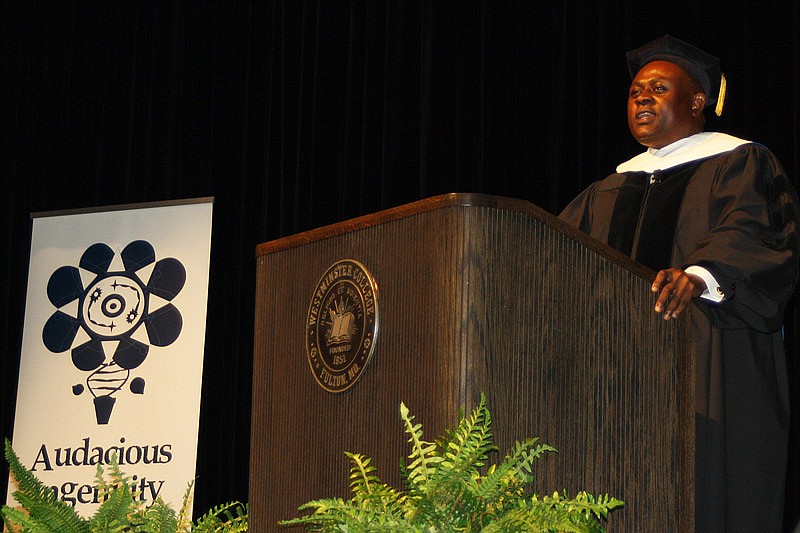In past years, Westminster College's time-honored Green Foundation Lecture has brought notables such as British prime ministers Margaret Thatcher and Winston Churchill and former world leaders Ronald Reagan and Mikhail Gorbachev.
On Thursday, the keynote speaker was Dr. Bennet Omalu, a forensic pathologist who brought public awareness to brain injuries of football players. Omalu and the event's spectators were welcomed to Westminster's Champ Auditorium by the school's president, Benjamin Ola. Akande.
"Today, you are part of a distinguished tradition," Akande told those assembled."Today is a very special day on our campus."
Akande gave a brief bio of Omalu.
"You might say our speaker today was born fighting," Akande said.
Both Akande and Omalu share a homeland - Nigeria - which suffered under a prolonged civil war in the late 1960s.
"One million died" from disease or violence, Akande said.
Omalu's Catholic family, which included seven children, escaped as refugees. But his father, Omalu said, carried shrapnel from that war within him until he died in 2014.
Omalu said smart boys were sent to medical school, and he was no exception, though he initially wanted to be an airplane pilot. He said he suffered from malnutrition even as an unborn child and struggled with depression as well. Omalu romanticized the American lifestyle and dreamed of living in this country.
After he became a doctor in Nigeria, Omalu moved to Seattle in 1994.
"I came to America in search of myself," he said. "I was more American than the Americans."
He said when he got here, he learned about slavery, and he learned about the Holocaust during World War II. Omalu decided he was an individual worthy of respect.
"There can only be one Bennet Omalu in the history of mankind - there can be only one of me," he said. "I couldn't let someone else define me."
Omalu started studying brains - sometimes at home on his kitchen table. He eventually became the chief medical examiner of San Joaquin County in California.
On Sept. 24, 2002, former professional football player Mike Webster died of a heart attack at age 50, following years of sustained head trauma. Omalu said Webster had depression, too.
"Remember, I suffered from depression myself, and people made fun of me," he said. "I woke up one day and saw Mike Webster all over the TV. When I got to work, guess who was on my autopsy table?"
Omalu said he was determined to find the cause of Webster's suffering.
"That was a culmination of all my life experiences," he said. "I saw myself in Mike Webster. I wasn't doing it for me. I was doing it for Mike Webster. I was doing it for all of us."
Omalu discovered Webster had a brain disease similar to that suffered by boxers, and he named it chronic traumatic encephalopathy. The NFL certainly didn't go along with the discovery, and some called it a "voodoo" diagnosis, Omalu said.
He stuck by his findings.
"Faith seeks the truth in you, in all of us," he said. "Science does the same thing. It seeks the truth. Faith and science are one."
Omalu said he doesn't mind what adults do - they are old enough to make their own health decisions.
"But knowing what we know today, why would children be allowed to engage in high-impact sports?" he said. "It's our duty to protect our children."
There is no cure to CTE, Omalu said. It cannot accurately be diagnosed while a person is still alive. Omalu said he met a person - presumably suffering from CTE - on Wednesday evening at a function in Columbia. When that person asked if there was anything to be done about it, Omalu told him no.
"Once you've been hit, the damage has been done," he said. "The concussion test has no value; all it does is make someone money."
In the audience Thursday was Bill Kenney, a former state senator who was a quarterback with the Kansas City Chiefs from 1979 to 1988. Kenney said his father, Charles Kenney, also played for the San Francisco 49ers in the 1947.
"He wore one of those leather helmets," he said.
CTE concerns many former football players, Kenney said.
"I've had a lot of friends who suffer from these injuries," he said. "Mike Webster was a friend of mine. He was my center in the 1984 Pro Bowl."
Kenney said he personally witnessed his friend and fellow player's suffering.
"His life just faded away," he said of Webster.
In June 2015, a class-action lawsuit was approved between the NFL and former players. Other lawsuits have been filed against other organizations, as well. In March, former NFL player Tracy Scroggins of the Detroit Lions (1992-2001) filed a lawsuit in federal court alleging he has CTE because he was encouraged to use his helmeted head as a weapon.

